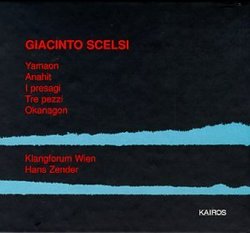| All Artists: Roland Hermann, Giacinto Scelsi, Hans Zender, Klangforum Wien Title: Giacinto Scelsi Members Wishing: 3 Total Copies: 0 Label: Kairos Release Date: 3/28/2000 Genres: Pop, Classical Styles: Vocal Pop, Opera & Classical Vocal, Chamber Music, Forms & Genres, Concertos, Historical Periods, Modern, 20th, & 21st Century, Instruments, Reeds & Winds, Strings Number of Discs: 1 SwapaCD Credits: 1 UPC: 782124120320 |
Search - Roland Hermann, Giacinto Scelsi, Hans Zender :: Giacinto Scelsi
CD Details |
CD Reviews"Anahit" is brilliant, but the rest is not R. Hutchinson | a world ruled by fossil fuels and fossil minds | 07/19/2006 (3 out of 5 stars) "Giacinto Scelsi was a mystic who liked to deny that he was a composer. He improvised on piano, or later the ondiola, and had others transcribe the results. Born to an aristocratic Italian family, he never had to work. He was extensively trained in music, including studies with Nadia Boulanger. He traveled to India and Nepal, he suffered a nervous breakdown, and he began to produce music as a form of meditation, a form of yoga to transcend limited, material reality.
Despite his unorthodox trajectory, Scelsi was quite prolific, and wrote for a variety of instruments, including the voice. This Kairos disc by Hans Zender and the Klangforum Wien can be seen as an introductory overview, but I am not impressed with most of the selections. "Anahit (lyrical poem in the name of Venus)" for violin and 18 instruments (13'44 - 1965) is stunning, and is the reason to hear this disc. The next best piece is "Okanagon" for harp, tam-tam and bass (8'33 - 1968), but it is simpler and not nearly as compelling. "Tre pezzi" for soprano sax (9'26 - 1956) is an early piece from before "Scelsi was Scelsi." Not bad, it has massive reverb, and sounds sort of like Jan Garbarek playing in a tunnel. "Yamaon" for bass singer and 5 instruments, and "I presgai" for 10 instruments, including prominent tubas, were both written in the late 1950s, and are both supposed to describe the demise of a Mayan city. They both make me cringe -- Varese was able to pull off something similar, but Scelsi's raucous bass voice and tubas just strike me as ridiculous. For superb Scelsi, I recommend either of the two discs featuring his music for strings, both called NATURA RENOVATUR, one on Kairos, and a new one on ECM (see my reviews of both). Scelsi's 1960s works for strings are incredible, and perfectly express his mystical vision, to transcend the illusion of separateness through one sound." |

